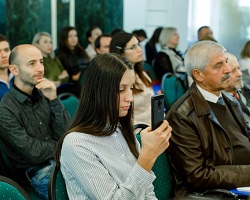World Mental Health Day focuses on preventing suicide across the Region

Marina Marmot
Several countries of the WHO European Region highlighted the scale of suicide around the world to mark World Mental Health Day on 10 October. This day also ended the “40 seconds of action” campaign on suicide prevention.
Suicide can be prevented, and there is help to be found – this was the crucial message shared through country office-led activities that included social media posts and roundtable discussions from Bulgaria and Ukraine to Turkey and the Republic of Moldova.
Bulgaria: advancing mental health reform
Bulgarian authorities and health-care professionals have supported ongoing discussions about the future direction of mental health reforms in the country, including at several roundtables on related topics. Over the past decade, Bulgaria also developed a new proposal for a national mental health programme and a national programme for suicide prevention, and hosted a mental health conference devoted to digital health and an international conference of the European Federation of Associations of Families of People with Mental Illness involving carers and users of mental health services.
In connection with World Mental Health Day 2019, the National Center of Public Health and Analyses undertook several activities supported by the WHO Country Office in Bulgaria. A press conference on the policy dialogue between stakeholders and policy-makers on the issue of suicide also took place on 10 October at the Bulgarian Telegraph Agency.
Republic of Moldova: increasing awareness
In 2016, the Republic of Moldova registered 643 cases of suicide (99 women and 544 men). To improve awareness of the significance of suicide as a public health problem, improve knowledge on what can be done to prevent suicide, and reduce stigma, representatives from 40 community mental health services and 41 youth-friendly health services from all parts of the country gathered on 9 October for the Mental Health Forum organized by the Ministry of Health, Labour and Social Protection.
During the Forum, the WHO Country Office in the Republic of Moldova presented information on global and regional suicide trends, and recommendations to decrease the suicide burden and improve prevention by empowering primary health-care professionals.
Ukraine: spotting the signs of mental illness
Each year, up to 7000 people in Ukraine die by suicide. The data show dramatic gender differences in such deaths: almost 80% of suicides in the country are by men. In many cases, doctors and health professionals at the primary health-care level overlook tell-tale signs in their patients.
“Recently, I saw one of my regular patients who suffered from episodes of back pain. When I started the examination, I couldn’t help noticing how depressed he was,” says Dr Tetiana Aksenchuk, a family doctor working in the primary care centre in Kramatorsk in eastern Ukraine.
To support general health practitioners who are not mental health specialists, WHO has been conducting a series of trainings in the country. The trainings focus on the use of the WHO Mental Health Gap Action Programme (mhGAP) Intervention Guide, a medical decision-making tool that allows non-mental health professionals to detect and manage mental health conditions such as depression, anxiety and self-harm.
“The man was very surprised to receive this type of support in addition to the usual treatment,” says Dr Aksenchuk.
Turkey: identifying alarming rates of mental health disorders in north-western Syrian Arab Republic
Rates of mental health disorders in north-western Syrian Arab Republic are increasing due to the ongoing conflict, yet mental health services are in short supply. Just over a fifth of primary health-care facilities in the region are able to offer basic mental health care. Only 2 hospitals provide services for patients with severe mental health disorders.
For World Mental Health Day, the WHO field presence in Turkey and its partners developed a survey for health workers in north-western Syrian Arab Republic to collect information on the prevalence of suicide.
The results were alarming. According to the survey, respondents knew of 736 people who had attempted suicide in the past 12 months and 47 people who had died by suicide. Attempted suicide was most frequent among those aged 21–30 years (57%). Of those who attempted suicide, 150 were internally displaced people (69%). Responses also revealed the stigma surrounding suicide.
The survey yields important insights and highlights a trend that demands urgent attention. The technical working group for mental health used it to design awareness-raising activities. On World Mental Health Day, a large event took place in the Syrian town of Termanin to increase public understanding of mental health issues and the risks of psychological stress.
WHO health partners held smaller awareness-raising sessions all over Idleb, covering topics such as depression and postpartum depression; suicide causes, prevention and management; and methods to relieve tensions positively through debriefing using coloured drawings with music. Events closed with a feedback activity of brainstorming, questions, debriefing and psychological support.



